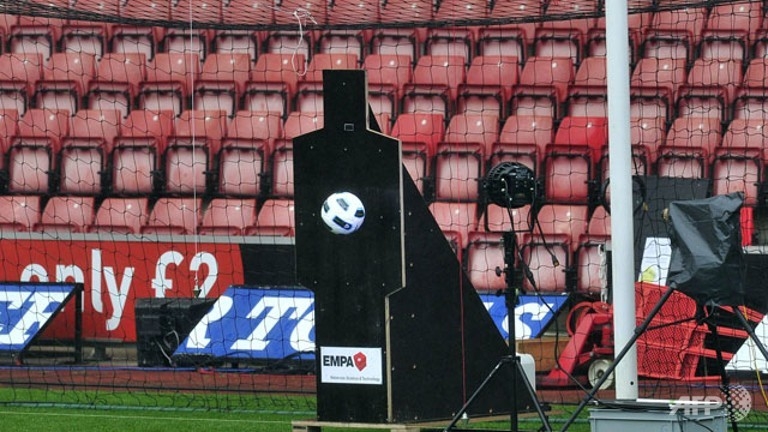Premier League approves goal-line technology

British-based firm Hawk-Eye was chosen over German company GoalControl to supply the ground-breaking technology at a meeting of the Premier League's 20 club chairmen.
Hawk-Eye's system uses seven cameras to track the movement of the ball and sends a signal to the match officials' watches within a second if the ball crosses one of the two goal-lines.
It will now be put in place at all Premier League grounds, while the Football Association also intends to install a system at London's Wembley Stadium in time for the traditional season-opener, the Community Shield, in August.
"The Premier League is pleased to announce that it has awarded Hawk-Eye, the world's leading provider of vision processing instruments to sport, the contract to provide goal-line technology systems across its 20 member clubs and all 380 Barclays Premier League matches," the league announced on its official website, www.premierleague.com.
"The camera-based system will be installed during the close season ready for use on the opening weekend of the 2013/14 Barclays Premier League season - Saturday 17 August.
"This will be the first time that goal-line technology is used in any domestic competition."
Premier League chief executive Richard Scudamore said that he was keen to see Hawk-Eye replays of contentious decisions relayed to fans during matches.
"The fact it was a camera-based system was critical," he said.
"Replays will be made available to all our host broadcasters and we are examining the feasibility of them being used on in-stadium big-screens. It is essential that fans see the system in action to know that it is working."
Paul Hawkins, the inventor of the Hawk-Eye system, said: "We understand the responsibility that we have been given and that the real challenge lies ahead in consistently delivering the technology that football deserves."
The Premier League, the world's most popular domestic football championship, is in line to become the first of Europe's major leagues to introduce the technology.
Its arrival will mark the biggest change in the English game since the back-pass rule was introduced in 1992, preventing goalkeepers from picking up passes from team-mates.
"It's probably one of those moments that will go down with the changes to the offside rule and the back-pass rule, which most of us at the time were very sceptical about, but which we've now taken to our hearts because we appreciate it and it's speeded the game up," said England manager Roy Hodgson.
Hawk-Eye, which was bought by electronics giant Sony in 2011, already provides ball-tracking systems for tennis and cricket.
Earlier this month, world governing body FIFA chose GoalControl, which uses another camera-based system, to provide the technology at the Confederations Cup in Brazil in June.
Goal-line technology has been introduced in a bid to eliminate controversies that occur when officials fail to notice that the ball has crossed the goal-line during matches.
One recent high-profile example occurred at the 2010 World Cup in South Africa, when England midfielder Frank Lampard was denied a goal in his side's last-16 encounter with Germany despite his shot having clearly crossed the line.
FA chairman David Bernstein said the Lampard incident represented a tipping point.
"This is long overdue and hopefully we won't have a repeat of the debacle in the last World Cup," he said. "It's a very important day and we have worked for this for a very long time."
Goal-line technology was used for the first time at last year's Club World Cup in Japan, when systems developed by both Hawk-Eye and GoalControl were deployed.
The head of Spain's La Liga said it hoped to bring in similar technology within three years.
"We are not going to be as quick as the Premier League but we are in favour of the system," Francisco Roca Perez told the Soccerex conference.
"I expect that in two or three years we will be able to do something like this, either with technology that we buy or that we create ourselves."
The Premier League, meanwhile, said it has ratified financial controls that limit increases in players' wage bills and oblige clubs to restrict losses to £105 million ($162 million, 123 million euros) over a three-year period.
What the stars mean:
★ Poor ★ ★ Promising ★★★ Good ★★★★ Very good ★★★★★ Exceptional
Related Contents
Latest News
More News
- Muong Thanh Golf Club marks five years with flagship golf tournament (October 01, 2025 | 18:25)
- TCP Vietnam opens new youth sports yard in Danang (September 22, 2025 | 18:46)
- 'Run For The Heart' to return to Ho Chi Minh City this September (August 29, 2025 | 15:31)
- LION Championship 25 to feature title showdowns in Khanh Hoa (August 15, 2025 | 14:24)
- AFF Women’s Championship 2025: Vietnam defeat Thailand in tense showdown (August 15, 2025 | 14:21)
- Hung Yen win National U11 Football Championship – Nestlé MILO Cup 2025 (August 06, 2025 | 11:34)
- Vietnam win third consecutive ASEAN U-23 title (July 30, 2025 | 07:00)
- Game-changing tech and startups to star at Vietnam Sport Show (July 18, 2025 | 14:56)
- Vietnam women's team secure 6-0 victory over UAE in Asian Cup qualifiers (July 04, 2025 | 15:32)
- Herbalife Vietnam supports VnExpress Marathon Quy Nhon 2025 (June 17, 2025 | 17:38)

 Tag:
Tag:




















 Mobile Version
Mobile Version